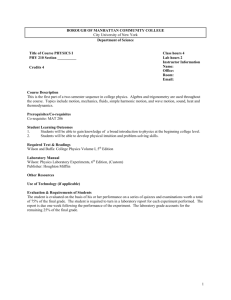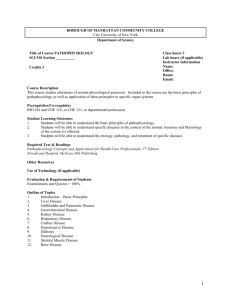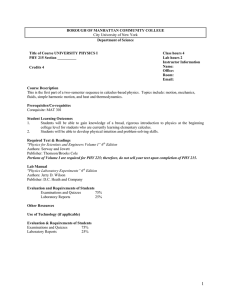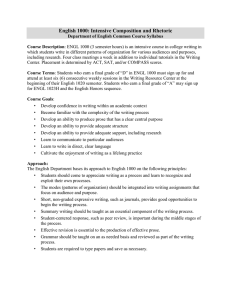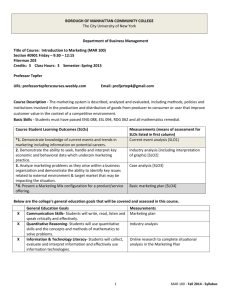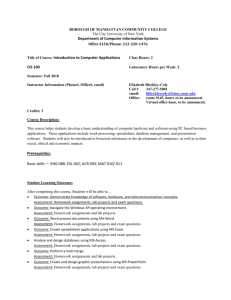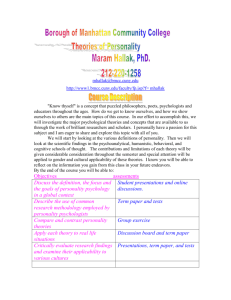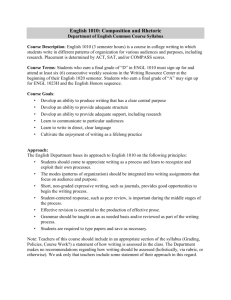BMCC - ENGLISH 101 - 622 Spring 2011
advertisement
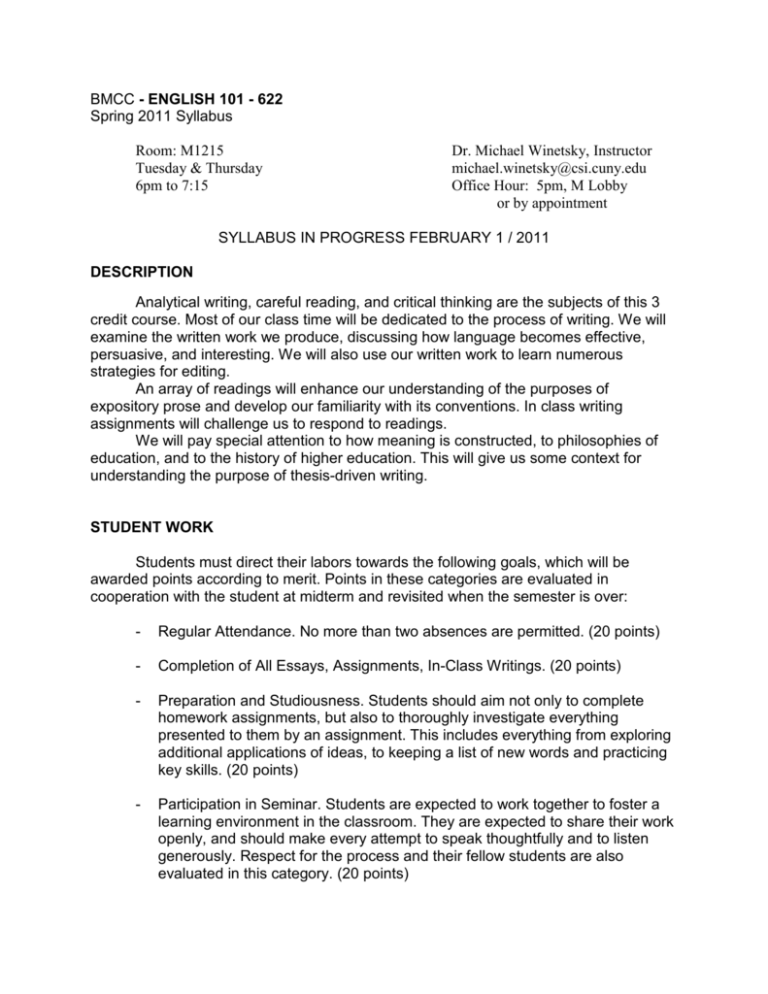
BMCC - ENGLISH 101 - 622 Spring 2011 Syllabus Room: M1215 Tuesday & Thursday 6pm to 7:15 Dr. Michael Winetsky, Instructor michael.winetsky@csi.cuny.edu Office Hour: 5pm, M Lobby or by appointment SYLLABUS IN PROGRESS FEBRUARY 1 / 2011 DESCRIPTION Analytical writing, careful reading, and critical thinking are the subjects of this 3 credit course. Most of our class time will be dedicated to the process of writing. We will examine the written work we produce, discussing how language becomes effective, persuasive, and interesting. We will also use our written work to learn numerous strategies for editing. An array of readings will enhance our understanding of the purposes of expository prose and develop our familiarity with its conventions. In class writing assignments will challenge us to respond to readings. We will pay special attention to how meaning is constructed, to philosophies of education, and to the history of higher education. This will give us some context for understanding the purpose of thesis-driven writing. STUDENT WORK Students must direct their labors towards the following goals, which will be awarded points according to merit. Points in these categories are evaluated in cooperation with the student at midterm and revisited when the semester is over: - Regular Attendance. No more than two absences are permitted. (20 points) - Completion of All Essays, Assignments, In-Class Writings. (20 points) - Preparation and Studiousness. Students should aim not only to complete homework assignments, but also to thoroughly investigate everything presented to them by an assignment. This includes everything from exploring additional applications of ideas, to keeping a list of new words and practicing key skills. (20 points) - Participation in Seminar. Students are expected to work together to foster a learning environment in the classroom. They are expected to share their work openly, and should make every attempt to speak thoughtfully and to listen generously. Respect for the process and their fellow students are also evaluated in this category. (20 points) - Critical Thinking. Students are expected to examine and evaluate ideas, to determine relevant considerations, and to recognize subtlety, and to exhibit what David Rossenwasser and Jill Stephen call “the Five Analytical Moves.” (20 Points) - Curiosity. (10 points) - Expression (10 points) Students with at least 65 points at midterm will be permitted to sit for the final examination. The Composition Committee requires students to write a thesis centered essay of 500 words during a 90 minute in-class session at the end of the semester. These essays are graded not only by your professor, but also by the committee. The student’s semester grade is determined 33% by their letter score on the final examination and 66% by their point score. TEXTS Textbook: David Rossenwasser. Jill Stephen. Writing Analytically. 5th ed. Exam Articles: Malcolm X. The Autobiography of Malcolm X. “Learning to Read” Plato. The Republic. “The Cave.” Other: John Dewey. Democracy and Education. George Orwell. “Politics and the English Language.” OTHER POLICIES All essays and short assignments must be received by the due date to be graded. No late work is accepted. Please be aware of the BMCC attendance policy. The policy states permits students no more absence than the number of hours the class meets in a week plus one. This English 101 course meets for 3 hours a week, so a student missing more than 4 hours of class is supposed to fail the course. BMCC Disability Statement In keeping with the college’s policy of equal access for students with disabilities, any student with a disability who needs academic accommodations is welcome to meet with me privately. Students requesting accommodations will also need to go to The Offices of Services for Students with Disabilities in N768. The office will supply you, if appropriate, with an academic accommodation letter for you to show professors. BMCC Plagiarism Statement Plagiarism is the presentation of someone else’s ideas, words, or artistic/scientific/technical work as one's own creation. A student who copies or paraphrases published or on-line material, or another person's research, without properly identifying the source(s) is committing plagiarism. Plagiarism violates the ethical and academic standards of our college. Students will be held responsible for such violations, even when unintentional. To avoid unintended plagiarism, students should consult with their instructors about when and how to document their sources. The library also has both print and digital guides designed to help students cite sources correctly. Plagiarism carries a range of penalties commensurate with severity of the infraction. The instructor may, for example, require the work to be redone, reduce the course grade, fail the student in the course, or refer the case to the Faculty-Student Disciplinary Committee (see Article 15.4 of the Bylaws of the Board of Trustees). Cases referred to that committee could result in suspension or expulsion from the college.
